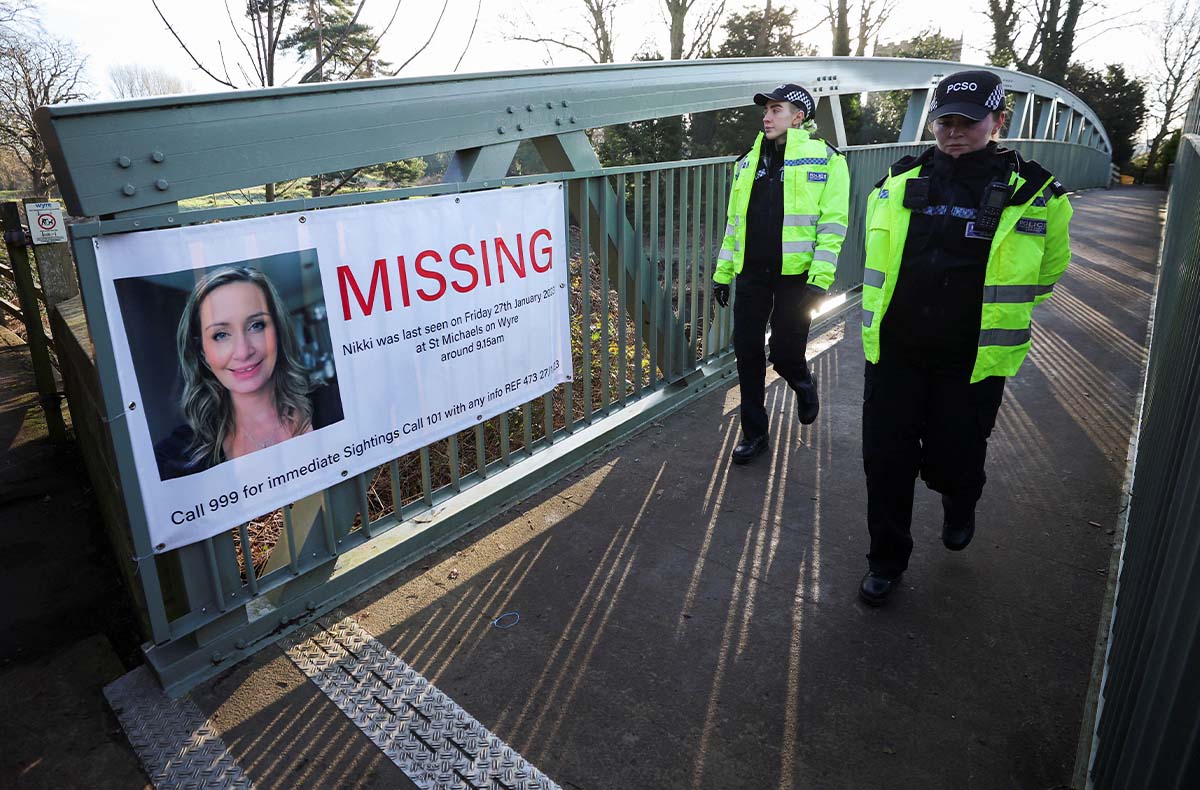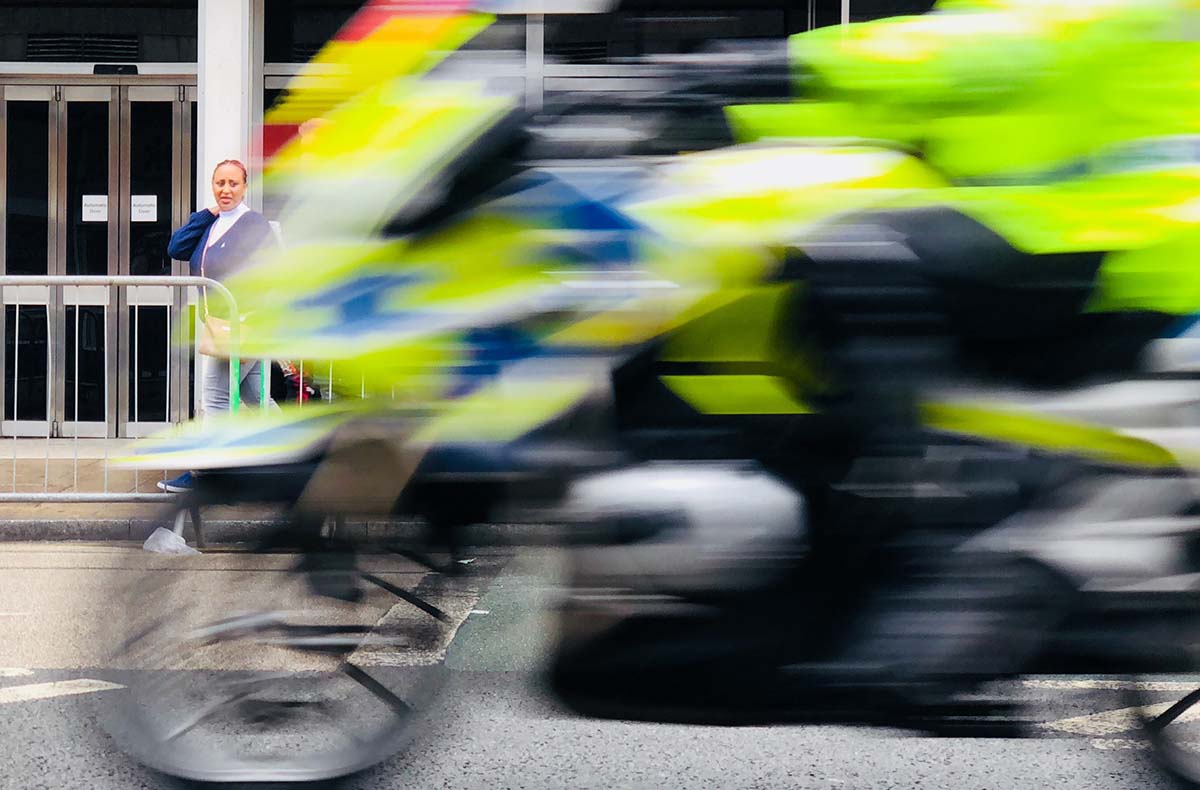
Wild speculation over the disappearance of Nicola Bulley says much about the shortcomings of the UK’s national and social media. But it also raises big questions about how police forces communicate.
Minutes after I sat down to write this column, the body of Nicola Bulley, the 45-year-old mum of two who disappeared while walking her dog next to the River Wyre in rural Lancashire on 27 January, was discovered less than a mile from where she was last seen. It was a tragic end to a tumultuous, often chaotic, three weeks in which Nicola’s disappearance dominated mainstream media headlines and online content.
First and foremost, my thoughts and condolences—and surely those of any right-minded individual?—go out to Nicola’s family, friends and neighbors. Nobody can imagine their loss, and I hope everybody upholds the family’s request to grieve in private.
In many uncomfortable ways, the national reaction to Nicola’s disappearance said much about the failures of modern communication in a world awash with poor quality information. So much requires reform and, dare I say, new thinking.
By the second week of Nicola’s disappearance, her family and Lancashire Police investigating the case had complained about the horrendous, intrusive and sometimes malicious online speculation about what had happened and what a distraction such attention had been to detectives.
Armchair detectives, schooled on an omnipresent media diet of true crime, gathered online to attempt to “solve” the live missing person case. Many were harmless and well-meaning folk who wanted nothing more than to locate Nicola. But as is often the case with social media, Nicola’s disappearance also attracted an unhealthy number of misplaced know-it-alls, cranks, gossipmongers, keyboard warriors, hapless “couch Columbo” types and those hellbent on malicious disinformation. Consequently, local police quickly became overwhelmed with nonsensical tip-offs, time-consuming enquiries and misdirections.
Worse, Nicola’s family, friends, and neighbors in St Michael’s on Wyre—the village in which she lived with her partner and their daughters—became the subject of wild, potentially libelous and accusatory speculation unsupported by evidence. Conspiracy theories were abundant. Nicola had been abducted, many claimed as though it was “fact.” Individual “abductees” were named, and their reputations trashed without even a shred of circumstantial evidence. (Full disclosure: I write that as a journalist once involved in a high-profile investigation, the management of which spiraled out of control amid what turned out to be false claims.)
And, of course, everybody online knew better than the real detectives working to find Nicola. In fact, it became clear that your average “couch Columbo” knew exactly how to: manage a team of 40 detectives; deploy wide-ranging police resources at short notice; geo-locate items; oversee challenging river and forensic searches; build databases of crucial evidence; and consult widely with communities far better than experienced professionals.
I lost count of how many times I saw casual observers suggest that sealing off a public footpath close to where Nicola was last seen as a “crime scene”—when, clearly, the police had no reason to suspect a crime—was a “no brainer.” As Lancashire Police were repeatedly forced to explain, officers had methodically searched the area the day Nicola disappeared.
But Lancashire Police’s own media strategy also merits scrutiny. While I have little doubt that, in terms of operational policing, the constabulary was broadly going about the investigation as it should, the way the police initially communicated with media and public was a salutary lesson in how not to do things.
Inadvisably, the force publicly declared hours into the case that its main working hypothesis was that Nicola had entered the river, possibly by accident. That had the effect of allowing the public to believe it was the police’s only theory (when it was not). Meanwhile, the constabulary repeatedly stressed it did not suspect a “third party” or “foul play.”
Consequently, a specialist search company volunteered its resources, spent three days scouring the area the police believed was most likely where Nicola had entered the river if she fell in, and promptly found nothing. Neither, in the first instance, did an experienced team of police divers. Finding submerged bodies in muddy, winter-cold and reed-laden rivers is a difficult challenge at the best of times—more so when the entire country is watching you.
The initial failure to produce evidence supporting Lancashire Police’s declared hypothesis meant that the media, as well as the public, began to question why police seemed less focused on a potential abduction. Public confidence plummeted further when officers at early press conferences appeared elusive and reluctant to divulge information supporting their main hypothesis. This public-facing “strategy” (or lack of it) had the effect of leading people to wonder whether Lancashire Police knew what it was doing.
That perception no doubt acted as a motivation to the enthusiastic army of self-appointed mystery solvers who then entered St Michael’s, Tik-Tok and YouTube-linked cameras in tow, to film their attempts to find clues and crack the case. Such “Scooby Don’ts” obstructed the work of genuine detectives: but, by then, few people were listening to the real cops.
A journalist colleague covering the case privately messaged me at that point. “The whole scene has become a mess,” he observed. “It’s anarchy in the village. Amateur sleuths everywhere. Police sources still say they believe Nicola is in the river.”
Quite.
The police issued a plea for calm. But their own poor communications had partly fuelled declining public trust.
How can we say that? Well, because after more than two weeks of intense criticism of Lancashire Police, the force finally presented its senior investigating officer (SIO), Detective Superintendent Rebecca Smith, at a press conference on 15 February.
There’s little doubt Det Supt Smith’s intervention was a game changer, communications-wise. The forthright SIO revealed that police had a stronger-than-normal reason to believe Nicola was in the river. Initially, she explained that, based on discussions with the family, Nicola was considered from day one to have “specific vulnerabilities,” making her a high priority and increasing the chances that her disappearance did not involve foul play (without, Det Supt Smith confirmed, ruling out that possibility).
Det Supt Smith also talked journalists through exactly why her team had excluded the possibility that Nicola could have walked away from key riverside areas. She revealed details of the parts of St Michael’s covered by CCTV. Including a nearby pub and lake, and a quiet lane leading to a caravan park around which unhelpful (and some vile) online theories had grown.
Of course, the SIO also admitted that not all parts of the area from which Nicola disappeared were covered by CCTV: leaving open the idea that she may have wandered or been taken, away through another route. But after Det Supt Smith’s insights, many “possibles” about which online detectives had speculated were ruled out.
Finally, some of the fog surrounding the case began to clear, and journalists expressed for the first time their view that the force had probably been doing a reasonably competent job all along. What the public had needed to hear were details of what the police knew, why, and when.
These are salutary lessons for public bodies. Communicate with clarity, provide all necessary detail regularly, and you stand a better chance of retaining public confidence.
This was a classic case of a police force, worried about giving away crucial investigative information, being undermined by a professional tendency towards silence.
It is always a fine balance to strike: detectives don’t want to reveal information that may be prejudicial to a potential criminal case. But in this instance, Lancashire Police—and public confidence—benefitted from releasing more information. It certainly halted some conspiracy theories, albeit three weeks after Nicola’s disappearance.
But here’s another communication lesson: beware the pendulum swinging too far. By being forced to release significant background information, Lancashire Police was then accused of overreaching.
Hours after describing Nicola’s “vulnerabilities”—a vague term that merely invited further questions—detectives revealed Nicola had been struggling with an alcohol-related problem caused by early menopause, and that emergency services were called to her family home on 10 February amid a “concern for welfare.”
Some media, MPs and charities lambasted detectives for revealing personal medical data about a missing vulnerable woman. Yet again, the constabulary was forced to defend itself, and explain more than it wanted to, because it had not foreseen the need for earlier clarity. It transpired that officers had spoken to Nicola’s family before releasing the medical information. It was not an ideal disclosure, Nicola’s family later affirmed, but they continued to support the police.
That did not stop some critics from being offended on Nicola’s behalf.
And then came the most awful discovery of all. On 19 February, Nicola’s body was found in the river downstream from where she was last seen. It seemed that Lancashire’s much-maligned officers, holding all the background information they had from day one, produced the correct professional hypothesis all along.
Finding Nicola, and not getting distracted by unfortunate sideshows had remained Det Supt Smith’s and Lancashire Police’s priority. Now it is for the operational professionals—coroners, forensics experts and others—to determine whether Nicola entered the water by free will or accident. They should be allowed to do that job unhindered by well-meaning amateurs, hacks after a tabloid story and the malicious online “mob.”
In the meantime, Lancashire Police’s communications team needs to reconsider its strategies. The force now faces two investigations into its handling of the case. But informed commentators have already latched onto poor communications as a key problem.
Most importantly, the whole country wishes every comfort and support to Nicola’s family while they grieve and rebuild their lives.



